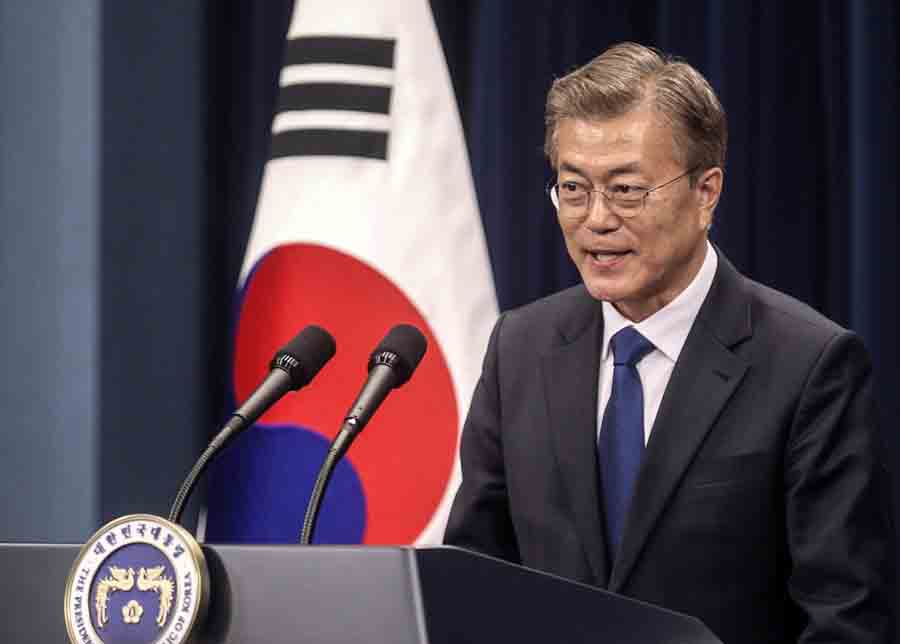Media Report

- The Washington Post reports: "New South Korean President Moon Jae-in said as he took office Wednesday that he is open to visiting rival North Korea under the right conditions to talk about its aggressive pursuit of nuclear-tipped missiles. Moon's softer stance on North Korea could create friction with Washington, which has swung from threats of military action to hints of dialogue as it seeks to formulate a policy under President Donald Trump. South Korea's first liberal leader in a decade, Moon also said he'll 'sincerely negotiate' with the United States, Seoul's top ally, and China, South Korea's top trading partner, over the contentious deployment of an advanced U.S. missile-defense system in southern South Korea. The system has angered Beijing, which says its powerful radars allow Washington to spy on its own military operations. In a speech at the National Assembly, Moon pledged to work for peace on the Korean Peninsula amid growing worry over the North's expanding nuclear weapons and missiles program. 'I will quickly move to solve the crisis in national security. I am willing to go anywhere for the peace of the Korean Peninsula — if needed, I will fly immediately to Washington. I will go to Beijing and I will go to Tokyo. If the conditions shape up, I will go to Pyongyang,' Moon said."
- Al Jazeera reports: "Chinese President Xi Jinping has said he will uphold the Paris agreement on curbing climate change, in a telephone conversation with French President-elect Emmanuel Macron...Xi told Macron that both China and France should 'protect the global governance achievements contained within the Paris Agreement on climate change', according to a statement by the China's foreign ministry...US President Donald Trump has expressed scepticism about the deal and threatened to pull out. Advisers are presenting him with a range of policy options and a final decision is not expected to be made before the G7 summit on May 26 and 27...In Bonn, where representatives of the nearly 200 countries that are party to the agreement are meeting to go through the technical aspects of implementing the accord, discussions are overshadowed by the uncertainty over Washington's position. Al Jazeera's Dominic Kane, reporting from Bonn, said that 'although there are delegates here that implement the Paris agreement in their own legislation, they very much fear what comes around the corner' from the US."
- Dallas News comments: "China is bent on world domination, not with its missiles and aircraft carriers, but by controlling solar energy, cloud computing and other industries of the future. That is an only slightly exaggerated version of a warning coming from the American chamber of commerce in China. It sent a delegation to Washington last week to warn that 'China's aggressive mercantilist policies are one of the most serious threats facing the future of U.S. advanced technology sectors,' as their policy paper says, and that the U.S. government isn't doing enough to counter the threat. The warning is especially startling coming from AmCham China, as it calls itself, which for years flexed its advocacy muscle persuading the United States to let China into the world trading system and rebutting Americans who it felt was too hard on China. 'Now we're saying that things are really lopsided, and the government needs to wake up and take action,' James McGregor, chairman of APCO Worldwide in China and part of last week's delegation, told me during a visit to The Washington Post. 'This is aimed at domination of the industries of the future. We're talking about artificial intelligence and all the things that are important to the American economy.' "
Calendar
- 2017-05-09 Senate Panel Approves Trump's Pick for US Envoy to China
- 2017-05-08 Trump Looms as Kushner Companies Courts Investors in China
- 2017-05-07 Taiwan arms deal in limbo as Trump courts China
- 2017-05-05 With maiden jet flight, China enters dog-fight with Boeing, Airbus
- 2017-05-04 China encircles the world with One Belt, One Road strategy
- 2017-05-03 Trump’s Turn Toward China Curtails Navy Patrols in Disputed Zones
- 2017-05-02 China: US, N. Korea should establish contact, defuse crisis
- 2017-05-01 Trump is not ruling out military action against North Korea
- 2017-04-28 US invests too little, not too much in China
- 2017-04-27 China welcomes U.S. saying it's open to talks on North Korea
News
- The Washington Post S. Korea's leader willing to visit North, talk to US, China
- Al Jazeera China's Xi pledges to support Paris climate agreement
- The Guardian 'Emaciated, unrecognisable': China releases human rights lawyer from custody
- Reuters China says Silk Road plan is not tied to presidency
- The Washington Post China says it successfully tests new type of missile
- Bloomberg China Overseas Audits Aim to Stem Outflows: Eye on Chinese Media
- The Wall Street Journal Auto Profits With Chinese Characteristics
- The New York Times Former Espionage Suspect Sues, Accusing F.B.I. of Falsifying Evidence
- Bloomberg China's Factory to World Catches a Break
- The Financial Times China investment brightens Pakistan's future
- The Wall Street Journal New Zealand Sentences Man That China Accused of Large-Scale Graft
- Reuters China's Xi congratulates new South Korean president
- The Financial Times China creates the world's largest chemicals group
Commentary
- The Dallas News: Commentary China wants to dominate key U.S. industries
- Bloomberg View Xi's Big Road Is Going to Be Bumpy
- The New York Times Opinion Pages The Princeling in the West Wing
- Barron's Iron Ore Stocks Rally As China PPI Slows More Than Expected
- The Washington Post: Monkey Cage In China, rumors are flying about David Dao's alleged $140 million settlement from United Airlines
- The Diplomat What Does Southeast Asia Think About the Trump Presidency?
- Quartz China's Alipay will soon be about as widely accepted as Apple Pay in the US
